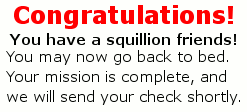
People ask me all the time, for ideas about how they can make their business better, stronger, and more profitable. They want to know what will convince more people to spend hard-earned money with their company.
I usually have some useful tips for them. I love to help, and I enjoy the look on their faces when they say “Why didn’t we ever think of that?” It is even more adorable when they call me to tell me that they implemented the tip and it is working for them.
It feels great to be helpful, and it keeps me sharp with new ideas. It is also why I write this blog, and why you see my direct phone line at the top of every blog post with the statement “I am always ready for a brainstorm. Call me at *REDACTED DUE TO AGING WEBSITE*.”
One of my best tips, in a single word, is “Awesomeness”. I will explain this, and how you can create greater awesomeness for your customers.
Being Helpful Grows Awesomeness!
I want to explain a principle that may seem scary to some people, but it is one which has served me very well in life, and in business. It requires patience and practice, but it has never failed me in the long-term. In order to explain it best, I will use my own experience. I could explain it in some fancy theoretical terms, but this comes from real life … my real everyday work.
It is my job to provide answers for improving companies and making them more marketable. I do a lot of my work free of charge. Well, at least I try very hard to blog about it in ways that people can use it. I’d call that work, so yes, I do a lot of my work for free.
Since I only work with a very small number of clients, and because a company has to be pretty serious about their marketing to hire my services, I make many efforts to help others without digging into their pockets. Don’t worry, it is not some kind of Jedi mind trick (video reference), and I am not selling something here. Being helpful gives me good karma, mojo, luck, or whatever you want to call it.
Being helpful is a principle that is used in abundance by successful companies, and successful people. You really don’t have to look around very hard to see this in action. It is a principle that is even more important when applied to the Internet, and I’ll tell you why. When it comes to Internet dealings, people have a very strong filter for noise. I wrote about this a while back, in an article titled “Will Your Social Media Noise Withstand 2011 Filtering?” They are also commonly very skeptical. There is a lot of “crap” on the Internet to overcome, as a consumer.
Many companies use blogs and other social media tools to be more helpful and interesting to their potential market. When they provide useful information, it brings attention to their brand. It is a means to express a company’s awesomeness and to put their helpfulness to work, and their company culture on the front line. There are many good reasons for companies to have a blog, in fact, I can offer you 10 really good reasons to blog.
I could stop right here, but I just told you this as a preface for the real point of this article. You can stop here, add your comments, tweet it, Facebook it, blog about it, and etcetera, but there is more! Yes, it is lengthy, but that is why there is a play button on my blog (at the top). If you don’t have time to read it, at least care enough about your business to push play and listen.
What Do They Pay For? That’s Right … Awesomeness!
The principle of being helpful is only one piece of success, but a huge piece that a lot of companies totally neglect. Somebody has to pay for all of that helpfulness, or the company would go broke. So, a lot of companies are left with a question of who will pay for that? Can you believe it? Companies actually treat it as a “dilemma” of whether it is a good idea for them to be helpful. This is why I find that even when they are helpful, they seldom make it to “awesome” status.

The reason I mentioned this principle of being helpful is because I want you to pay attention without thinking I am here to sell you something. Call it a bonus, and whatever you do, please try to implement that tip. Be helpful … It is for your own benefit!
Now I am going to tell you what people actually pay me for, and explain ways you can benefit from it without having to pay me. Come to think of it, this may not go just right, but I am pretty sure I am not obsolete quite yet. In any case, I want you to use this for your own gain.
This May Not Be Awesome, But it is Helpful!
As a marketing guy, a huge amount of my work is not focused on helping companies with the obvious marketing task of getting their name in front of more people. Does that sound strange? It probably sounds totally crazy to a lot of people. In fact, you may be wondering, “Where in the heck do you find these idiots who pay you, Murnahan?” Yes, I am paid by aliens from another planet … but they are very successful Zarkmobians from Planet Narburloid.
It is true, though, because a significant amount of my work involves making them more marketable. That means digging into who they are, as a company. They pay me to develop a strong understanding of who they are, and to uncover what makes them more like sex, bacon, and other things people love. My job is to get a solid grasp on their “awesomeness” by viewing the culture of the company from a unique perspective. With this, it is my responsibility to create their best marketing strategy.
You can get a better picture of your awesomeness by talking to people. Ask people you respect. Ask people you don’t respect. Ask people who buy from you. Ask people who don’t buy from you. Ask without a word, by researching your market, and uncovering the real forces that drive your market. Ask a lot of questions, and pay careful attention to the answers. This will help you to discover your best customers!
Discovering the Model Customer
Once I know a company’s best assets (their awesomeness), I can begin the research to build a perfect model of their customers. Knowing the right audience is extremely important, especially if you want a return on your marketing investment. I wrote about this a couple times recently, and I hope you read those articles. I will add some links below, but if you are not a subscriber, do it now … it is free. I will say it again, though … ask a lot of questions, and pay attention to the answers. Below are some links to help you with your customer modeling, but note that they will only help you if you use them!
- Target Your Marketing and Love Your Customers Again
- Facebook Marketing: Pages, Customer Modeling, Promoting, and Awesomeness
- Polarize Your Audience and Stop Making Everybody Happy
- Propensity Marketing and Database Aggregators

How Does the Company Fit Into the Market?
After the ideal customer models are in place, I can accurately direct my clients as to how they fit into their marketplace. Then, I can also provide steps to better adapt to their market. This is when the real awesomeness is unleashed. It is completely different for every company, in every industry.
If you do not know your competition, you probably don’t know your market very well. You need to know your market before you can even begin to get ahead. If you learn the forces working against you, it will be a whole lot easier to overcome them.
Spend some time knowing your market, including your competition. Most companies do a terrible job of this, so it is like low hanging fruit for you. Pick it!
Producing Awesome is Not Easy!
Most companies simply cannot see their business clearly from a marketability standpoint, and it becomes their Achilles heel. This destroys many companies.

Even when they think they have a good grasp on their “awesomeness”, most companies do not express it very well. I have said a lot about good reasons to blog, and good uses for social media. None of it centers on the use of destructive interruption marketing.
The challenge here is to present your company in a way that it is appealing to the customer, based on what they want, instead of just what the company wants.
I return to the principle of being useful. Most companies, including your competitors, will not have the required patience to be useful and give their customers a reason to buy from them. Many will just hope to flash a sale price and scream their selling message, but only a relatively few will put aside the selling enough to understand what will inspire buying.
Most companies (yes, most) will choose to skip the important research. It is not easy work, and it bores a lot of people to tears. It becomes too much hassle to actually build their understanding of the customer. For a lot of people, it would be cruel and unusual punishment just to finish reading this article, not to mention actually implementing the suggestions.
Here is where the punishment really pays off: If you understand your customers’ motivations to buy, and address it properly, they will tell each other. Your job becomes a lot easier.
Delivering Awesomeness to The People
Once the marketability factors are perfectly in place, it is a whole lot easier to deliver it to the people. Delivering something marketable to the people is simple! Have you seen how many amazing tools there are for delivering a good message to people? Just think of the first ones that come to mind. Facebook, Twitter, YouTube, Google, blogs … and the list goes on.
How To Become Popular on Twitter Without Actually Being Useful
Social Media and The Absurdity of Implied Reciprocity
So you must be asking, “How did these make the phone ring?” It was because those little pieces of awesomeness made people think. They made people laugh. They compelled people to share them with others, and they created a squillion new links to my blog. Bonus Points: They were also extremely relevant to my industry.
Those links enhance my SEO (search engine optimization), and reflect credibility to search engines by showing popularity. That credibility helps everything else I write about to rank higher in search engines. That is how SEO works! This matters far more than the mechanical approach to SEO. The trick is to be awesome as often as possible, or at least as a high percentage of your efforts.
Are you getting it yet? A little bit of awesome carries a long way. I don’t make “awesome” happen every time, and you will not either. I know when it is needed, how to do it, and why it matters. That comes with practice, so start practicing!
How much more can I say? I gave you a lot of good links within this article, and I did not include a single one to waste your time. I just gave you tools to learn and implement excellent marketing. I hope I have encouraged you to take the same approach of researching your market and to provide value to your potential customers.
Of course, companies pay me for a lot more than what I included here. If you have the time to exercise your patience, and put some practice to use, you will find a whole lot more free assistance in my blog archive. I do it to be useful, and that works for me. I believe it will work for you as well.
I will allow you this moment to practice being helpful and awesome. This is your chance to add your helpful comment, and share how you apply these principles, or how you feel you could do better. If you want to get outrageously helpful, give this a tweet, a Facebook like, a stumble, a digg, or whatever it is that you do to share helpful things with others.
Podcast: Play in new window | Download









